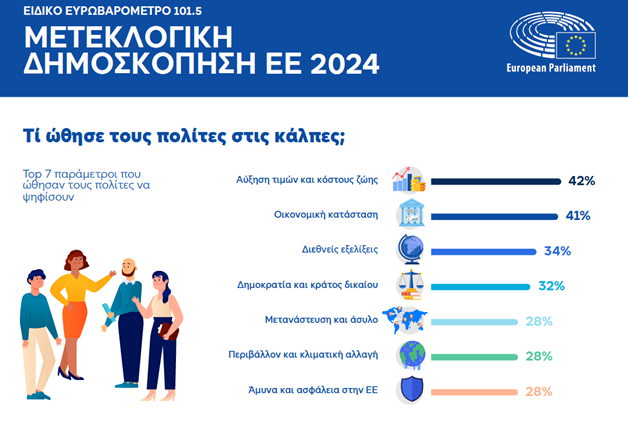The escalating cost of living and the financial well-being of citizens emerged as the primary drivers behind voter choices in the June 2024 European Parliament elections, according to data from the “Eurobarometer” released on Thursday by the European Parliament. The survey offers insights into voter behavior and highlights the key priorities of EU citizens.
Rising prices and the cost of living (42%), and the economic situation (41%), are the main topics that motivated European citizens to vote in the last European elections in June this year.
These figures were considerably higher for Greece and Cyprus, with the figures for cost of living reaching 70% and economic situation at 69% for Greece, while for Cyprus they were 47% and 56%, respectively.
A third of voters (34%) say that the international situation is a topic that encouraged them to vote, while a similar proportion mentions defending democracy and the rule of law (32%).
In Greece, the third most important issue motivating citizens to vote (at 40%) was social protection, welfare, and access to healthcare, while 37% of respondents cited the international situation.
In Cyprus, immigration and asylum issues played a significant role (45%), with education ranking fourth on the list (26%).
The protection of peace and strengthening of security ranks very high (45%), in Greece, followed by improved cooperation between Greece and other EU countries (36%). Similarly, in Cyprus, the protection of peace and strengthening of security also ranks high (43%).
Those who did not vote also say the cost of living (46%) and the economic situation (36%) could have motivated them to participate in the elections.
The corresponding figures in Cyprus are 53% and 42% (with immigration issues ranking second at 45%), and in Greece 65% and 58%, with social protection, welfare, and healthcare in third place (40%).
Trust in European parliamentary democracy is particularly high, with 42% of European citizens holding a positive image of the European Parliament – the highest-ever result recorded.
What is more, citizens are optimistic about the future of the EU (65%) and continue to hold a positive impression of the EU and the European Parliament.
EU membership is viewed favorably by the majority of EU citizens, with seven out of ten (70%) Europeans thinking that their country has benefited from being a member of the EU, a figure that has been stable in recent years.
In Greece and Cyprus, specifically, the percentages of citizens who view the EU positively are also high—65% and 68%, respectively.





